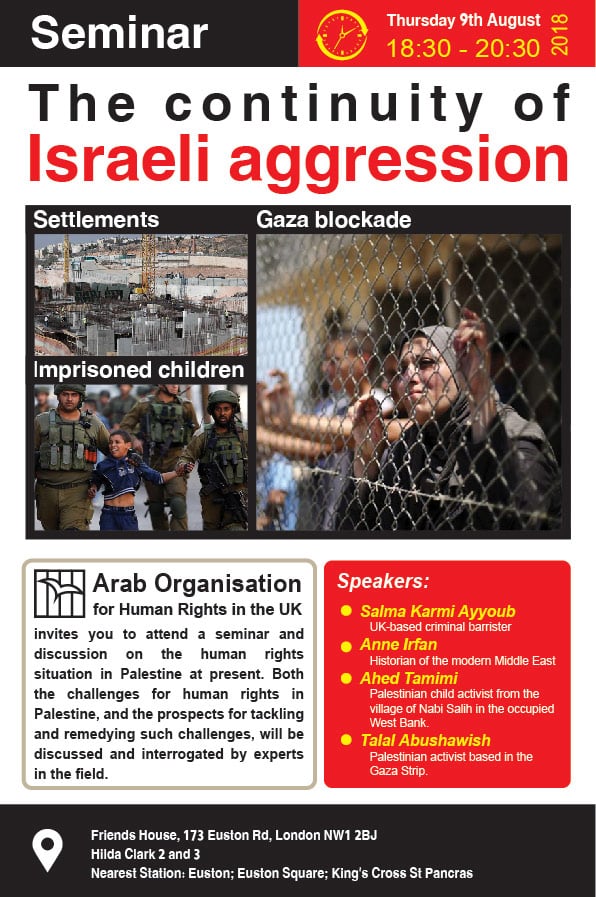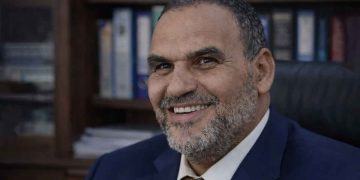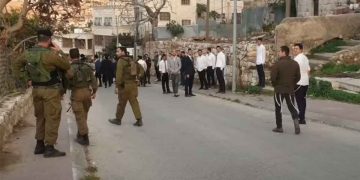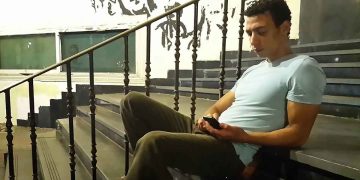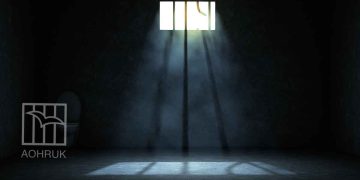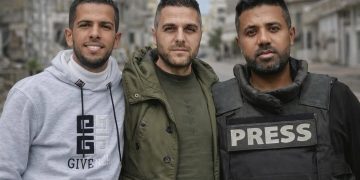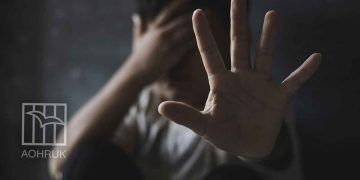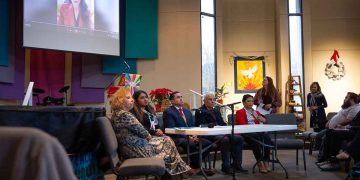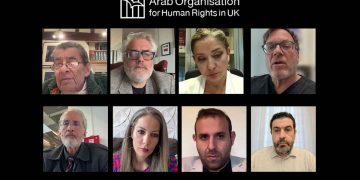With continued Israeli settlements, the imprisonment of children, the Gaza blockade, and the Jewish Nation-State Law further eroding the human rights of Palestinians, the situation at present looks extremely dire for the Palestinian community. In this light, the Arab Organisation for Human Rights in the UK invites you to attend a seminar and discussion on the human rights situation in Palestine at present. Both the challenges for human rights in Palestine, and the prospects for tackling and remedying such challenges, will be discussed and interrogated by experts in the field.
Date:Thursday,9th August 2018
Time: 18:30-20:30
Venue: Friends House, 173 Euston Rd, London NW1 2BJ
Room: Hilda Clark 2 and 3
Nearest Station: Euston; Euston Square; King’s Cross St Pancras
Speakers:
1) Salma Karmi Ayyoub
UK-based criminal barrister and external consultant for the Palestinian human rights organization Al Haq.
2) Anne Irfan
historian of the modern Middle East, specialising in Palestine and the Levant.
3) Ahed Tamimi
Palestinian child activist from the village of Nabi Salih in the occupied West Bank.
4) Talal Abushawish
Palestinian activist based in the Gaza Strip.
Background :
Israel’s goal in the West Bank is to minimize Palestinian presence communities in order to use the territory for its own uses, including expanding settlements.
One of these communities is known as the Khan al-Ahmar School community. The community is located two kilometers south of the settlement of Kfar Adumim. According to updated figures, it is home to 32 families, totaling 173 persons, including 92 children and teenagers. It also has a mosque and a school. The school, which was built in 2009, serves more than 150 children between the ages of six and fifteen, about half of whom come from nearby communities. For years Israel has been attempting to displace this community for a variety of reasons, including the expansion of nearby settlements, de facto annexation of the area – without its Palestinian residents – and bisecting the West Bank, cutting it in two. To that end, Israeli authorities have made the lives of the residents intolerable, hoping to make them leave their homes, ostensibly of their own volition: the authorities refuse to hook them up to running water, electricity or a sewage system, refuse to pave roads for them, prevent construction of homes or structures for public use in the community, and have restricted their pastureland. This policy forces the residents to live in unbearable conditions, suffering a severe dearth of services in health, education and welfare.
Israel has imposed restrictions on freedom of movement in the Gaza Strip since the early 1990’s. Restrictions intensified in June 2007, following the takeover of that part of the occupied Palestinian territory (oPt) by Hamas, when Israel imposed a land, sea and air blockade on Gaza, citing security concerns. Despite relaxation of some blockade-related restrictions in recent years, 1.8 million Palestinians in Gaza remain ‘locked in’, denied free access to the remainder of the territory and the outside world. The blockade has undermined the living conditions in the coastal enclave and fragmented the oPt and its economic and social fabric. The isolation of Gaza has been exacerbated by restrictions imposed by the Egyptian authorities on Rafah, its single passengers crossing.
On 16 July2018, the Israeli authorities announced that they would restrict the entry into the Gaza Strip of fuel and cooking gas through Kerem Shalom crossing, the only operational commercial crossing between Gaza and the outside world. The import of medical and food supplies may be approved on an individual basis. The restrictions follow the imposition of a new set of severe restrictions by the Israeli authorities on 9 July, wherein only food, medical supplies, animal fodder, livestock and fuels would be allowed into Gaza via Kerem Shalom, without quantity restrictions. The entry of all other items, including building materials, furniture, wood, electronics and fabric, was halted, as was the exit of all goods.
Also on 16 July, the Government of Israel announced a reduction in the permissible fishing zone from six to three nautical miles, preventing fishermen from accessing 85 per cent of the fishing areas agreed for Gaza under the Oslo Agreements, with direct impact on some 50,000 Palestinians who rely on fishing for their livelihood. This followed the 9 July termination of a previous extension of the fishing area along the southern coast of Gaza, from six to nine nautical miles.
Since the imposition of these restrictions, on average, around 192 truckloads carrying the permitted items have been allowed through each day. This amounts to 46 per cent of the daily average of trucks that entered during the first half of 2018.
Since 1967, Palestinian children in the Occupied Palestinian Territory have been living under Israeli military law and prosecuted in military courts Israel is the only country in the world that automatically prosecutes children in military courts that lack basic and fundamental fair trial guarantees. Since 2000, at least 8,000 Palestinian children have been arrested and prosecuted in an Israeli military detention system notorious for the systematic ill-treatment and torture of Palestinian children. Around 500-700 Palestinian children are arrested, detained and prosecuted in the Israeli military court system each year.
